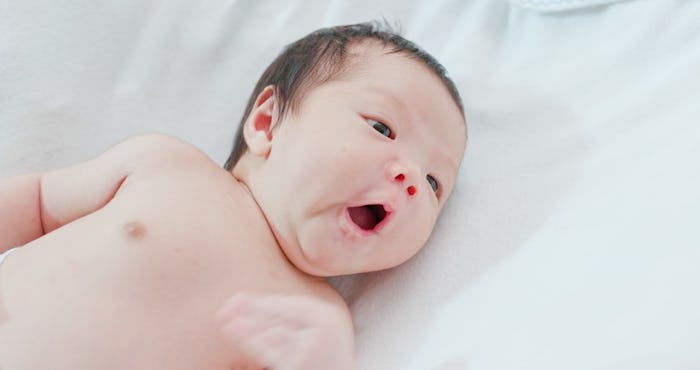Life

Why Does Your Baby Breathe So Fast? It's Nothing To Hyperventilate Over
For new parents, it’s nearly impossible not to notice every tiny movement a newborn makes, worrying and fretting over each squeak, hiccup, and mew. Before babies can communicate, this constant observation is a way of searching a little one for signs. Did that wince mean they’re hungry? Did that burp mean they have gas? And then there’s the ever present mystery: Why do babies breathe so fast?
Before you hyperventilate over concern for your child’s oxygen intake, take, well, a breath. There’s a perfectly good reason babies breathe so fast.
“Babies breathe faster and often a bit irregular [compared to] adults as they are tiny,” Leigh Anne O’Connor, an infant expert and International Board Certified Lactation Consultant, tells Romper. “They primarily breathe out of their noses and they are learning to breathe.”
That means a good 40-60 breaths per minute, according to Medical News Today, as compared to an adult’s average of 20.
Still in the throes of Respiration 101, babies are just getting their footing with this whole breath thing, a far cry from the cozy confines of their in utero intake where oxygen came directly from their mother’s umbilical cord. Breathing IRL, well, it’s an entirely new matter.
“Their bones are formed but they are soft for speedy growth,” O’Connor adds. “The ribs are there but they are softer than adult bones.” Underneath these malleable ribs are small lungs and weak muscles. In fact, a baby’s lungs aren’t fully developed until they’re around 2 to 3 years old, reported the American Lung Association. Which might explain their puppy-like panting.
Of course breathing is a critical function and there’s good reason to be concerned if you believe your child is showing signs of respiratory difficulty. But there’s a way to test their air flow before you panic.
First, you can place a hand on their chest. Medical News Today explained that each rise of the chest counts as a single breath.
Another option is to place your hand near your baby’s nostrils and count each exhale.
If your counts seem wildly different from the aforementioned average — be it too fast or very slow, or if they're turning blue — O’Connor tells Romper, it’s time to raise the alarm and call a medical professional.
Lin Cook, a professional labor doula, seconds O'Connor's advice regarding babies showing any signs of blue discoloration on their faces.
"If a baby is acting lethargic or sloppy, they might not be getting enough oxygen," Cook tells Romper. Or if an infant appears to be panting, "I'd definitely take them to the ER," she adds.
Cook also suggests writing these indicators down.
"I think having a checklist does aid a new parent in going 'OK, we can come off the ledge here,'" Cook says.
But if you're extremely concerned, but all means, seek professional help.
“As with anything new parent-related it is ok to call the pediatrician even if you are not sure,” says O’Connor.
Expert sources:
Leigh Anne O’Connor, an infant expert and International Board Certified Lactation Consultant, LeighAnneOconnor.com
Lin Cook, Professional Labor Doula, Certified Bradley Method® Instructor, Anatomy and Physiology of Birth Certified, Assistant Labor Coach Certified, International Board Certified Lactation Consultant, mothershelper.biz
This article was originally published on